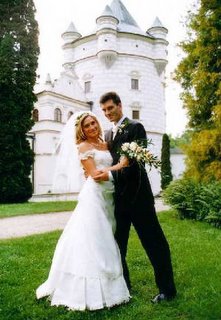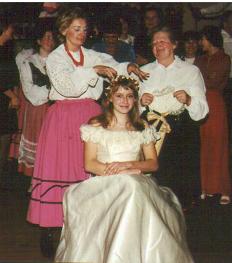
Polish girls, unlike girls from Western countries, are brought up in close-knit families where mutual love and respect are priorities. Therefore family life is very important for them. From the very beginning Polish girls are taught to care not only for their immediate family but their distant relatives as well. Girls are taught to respect their siblings as well as their elders. The girls are not supposed to be obnoxious, loud, or ill mannered. On the contrary, they are expected to be well behaved, disciplined, cheerful and calm. Since the divorce rate is very low among Polish families, the girls learn to be mature and efficient in running the household early on in their life. It is easy then for them to apply the practical knowledge they gained at their own home once they get married and start their own family.
Early on in their lives, girls in Poland are taught to clean, cook, knit, sew, and mend clothes. Girls are expected to help their mothers with the housework. Since many women in Poland work outside of home, young girls are often expected to even take over their mothers’ housework duties such as grocery shopping, cooking, washing the dishes, and doing the laundry. Girls are a big help especially with the preparation for large family gatherings where there are a lot of dishes going around and a lot of cleaning later. Girls are encouraged early on to learn family recipes so that later on they can pass on the tradition of excellent dishes once they start their own families.
Polish girls are brought up to have great respect for their culture and tradition. This education usually begins at home. The parents and grandparents make the girls aware of a sense of patriotism and loyalty to their own country. The girls are taught traditional Polish songs that carry the history of Poland in their lyrics. Schools take over the function of instilling culture and tradition into Polish girls. Every school proudly displays Polish national emblems and the flag. Polish traditions are especially respected during two major religious holidays: Easter and Christmas. During Easter, young Polish females help prepare the food basket whereas during Christmas they work hard on getting the holidays meals ready while listening and singing Polish carols.
Just like culture and tradition are instilled into young Polish ladies early on in their lives, so are religious principles. The majority of Polish people are Catholics and the upbringing of Polish girls is based on the principles of Catholicism. As children and teenagers, young Polish girls are expected to attend church every Sunday. One of the very important events in the religious life of Polish girls is the first communion that prepares the girls to enter into adult life while minding religious rules. As religion is a very important aspect in bringing up Polish teens, they wait before starting their sex life until they find the right person to get married to. This is not to say that they do not date. They do. Many of them will start dating in high school and college and end up marrying their high school or college sweethearts after they are finished with their education. Polish girls are not as liberated and modern as western women and they take their commitments very seriously.
Girls from Poland attend coeducational schools where they receive equal education to the one boys get. They are brought up not only to excel at all the subjects but also to be disciplined students. They are usually quiet and very well mannered. Their education is not only comprehensive but also very much in-depth. Girls study arts, sciences, and foreign languages, and practice sports. Apart from being enrolled in compulsory courses, Polish girls also take part in many extracurricular activities. Many of them are in school basketball team, sing in the choir, or play in the school band. After graduating from grade school, Polish girls strive for a better education by attending colleges and universities. They often pursue careers in education, nursing, medicine, and engineering.
As teenagers, Polish girls enjoy many of the same things that girls from other countries do. As teenagers, the girls are encouraged to pursue their hobbies. They like to listen to music, dance, play sports and watch movies. Many of the girls belong to clubs of interest where they can share their talents among teenagers with the same interests. They are often encouraged to play different instruments whether at school or at music school or enroll in ballet classes.
Polish girls are known for their beauty, grace and femininity. Their unusual beauty has been recognized in 1990 when Agnieszka Kreglewska became not only Miss Polonia but also Miss World. They pride themselves on their taste in clothes and fashion. The closeness of Poland to the capital of the world’s fashion - Paris - makes it easy for them to follow the newest trends in style.
The Engagement CeremonyIn Polish culture, weddings are preceded with engagement celebrations. Those are usually small parties held for the closest family members of the groom and the bride and are meant to get the two families meet and get to know each other better. In some cases, it is time when the parents-in-law meet for the very first time, so it is a show off time accompanied with fancy dinner, luscious desserts and a variety of non-alcoholic and alcoholic drinks. The engagement dinner party pretty much means that both families accept the engagement.
In the past, the engagement ceremony was the time when the future bride received a ring from her beloved partner before the entire family gathering in a very official way, which resembled to some extent the wedding ceremony itself. In recent years, however, that official note has been largely abandoned and a ring is delivered when the future groom pops the question for the first time in a more private setting. The family gathering is just a nice way of informing the family members about the mutual decision once it has been made.
The Polish Wedding CeremonyFor many years, preparations for the Polish wedding ceremony and reception were largely concerned with finding a place for the wedding, organizing food, drinks, making guest-list and inviting people to the wedding. In some regions, especially in the countryside, the custom was to invite family, friends, and neighbors in person, so the future groom and bride would devote a lot of time to visiting people before the wedding day. In the modern day, although the tradition prevails in some places, open-minded Polish younger generations and celebrities copy the western examples and some Polish brides and Polish grooms like to hold bachelor and bachelorette parties shortly before the wedding day. Playing pool and throwing darts during the bachelor parties is not quite there yet on those occasions; nonetheless, socializing and too heavy drinking sound more like it. The bachelorette parties usually involve girlish gossip with closest friends. In the Western cultures, the bachelor and bachelorette party symbolize saying goodbye to the youthful carefree life on the threshold of serious family responsibilities.

During the communist ruling in Poland, each couple had to go through two wedding ceremonies: first the civil marriage at a local magistrate and then the religious vows in church. The reason for the double ceremony was the fact that the communist government did not accept the Roman Catholic Church weddings as legal despite the fact that well over 90% of Poles were Catholic, so both ceremonies had to be undertaken to make the marriage legal and righteous. Today, one wedding ceremony in Poland is sufficient. Couples that decide to have a religious marriage ceremony can head straight to their church, which passes the information over to the vital statistics registrar's office for legal registration. Polish men and women who feel liberated from religious concerns settle with a civil contract - as it is literally called. Churches announce the upcoming weddings three times a few weeks in advance. It is not to have more people attend, rather, it is meant to give everyone a notice about the upcoming marital union so that anyone who may know any reason that should prevent the marriage has time to come forward. In each church, there is a list of upcoming weddings posted by the entrance.
Catholic Church requires couples to attend classes preparing them to handle married life and to solve problems newly married couples may encounter once they become a marriage. It turns out that most marital conflicts are about money. Learning such things is valuable in overcoming potential break ups, which is extremely important to keep the marriage unbreakable, as the Catholic Church believes it should be. The Church allows Catholics to marry people of other faiths; still, such marriages are at the Catholic person's risk because while he or she is bound to the marital vows, the non-believer is not and free to leave anytime. The wedding ceremony itself is normally accompanied with a mass celebration at the heart of which are the vows and blessing of the marriage. While in the Western countries the vows are read by the pastor and the bride and the groom just confirm with a short "I do," in Poland both the bride and the groom have to repeat the whole pledge after the priest, so the priest in fact just leads the couple and witnesses their vows. It is the bride and the groom themselves who enter the marriage and make promises of love, faithfulness, marital honesty, and never leaving the spouse until death to each other.
Most Polish weddings take place on Saturdays and continue through Sundays. The marriage ceremony and wedding reception for all guests are held on Saturday, while a smaller, more private party for close friends and family is continued on Sunday. There are no weddings during the 40-day Lent before Easter and during the Advent before Christmas. Those periods of year are believed to be the time dedicated for penance and preparation for the most important Christian holidays, so there is not space for public celebrations and dancing parties. Interestingly enough, there are very few weddings in May as well. This is mostly due to superstition, as many people believe that persons who marry in May are not going to be happy and won’t live together long.
The wedding starts with the groom arriving to the house of the bride before they head to the church. His parents, godparents, closest family, and the best man accompany him. In the turmoil of last preparations, light snacks, for instance sandwiches, are served to the guests and sometimes a band cheers the crowd up with lively songs. Once the couple is ready, both parents give their blessings the kneeling couple and they all are off to church. Obviously, everyone wants to shine on that day, so the young couple rents or borrows a nice ride from a rental agency or family members if they do not own one. In some regions, decorated horse carriages are popular for such occasions. Depending on the families' budget and local traditions, the richly decorated parade to church can be quite a view especially if it involves regional costumes and horses adorned with white flowers and ribbons.
In the church, the bride and the groom walk up the aisle together preceded by their groomsmen and bridesmaids. The parents and other guests are usually already seated when the couple enters the church. Whether the ceremony takes place in church or at a local magistrate, there must be two witnesses of the marriage, who endorse the documents alongside of the bride and groom. During the religious ceremony, the traditional in the Western movies kiss basically does not exist. Civil ceremonies are less solemn and usually only the bride and groom, and the witnesses are allowed in the room, so whether they kiss or not, very much remains their private venture.
After the happy newlyweds exit the building, they are taken by storm with congratulations, best wishes, and flowers. Once every attending guest had kissed and hugged the couple, everyone is heading to the reception site, be it a restaurant, banquet hall, or one of the newlyweds house. On the way to the destination, a very popular custom is preparing by the wedding participants, although not necessarily, passing "gates" for the couple. To pass such gates, in most cases barricades on the road by objects or people, the newlyweds have to give out some food and vodka. The wedding reception starts once the married couple arrives and is traditionally welcome by the entrance with bread and salt. Bread and salt are the symbols of future prosperity so that the couple never goes about hungry in their lives. The wedding party lasts as long as the guests want to stay, in most cases overnight. Polish weddings are known for an unbelievable abundance of all kinds of foods and alcohol. In the past decades, Polish weddings were basically two-day feasts with dancing and games. In recent years, most people scale their budgeting and time, so the weddings start to resemble wedding receptions in the West with a nice dinner and a short duration.
Guests, who arrive from distant places, are usually welcome to stay at the newlyweds' parents or other family members' houses. Suggesting a stay at a hotel would be considered very impolite. So, no matter how crowded the houses get, it is all for the family relations benefit. After all, the saying goes: the more the merrier. Those guests, who have been invited but do not attend, are still expected to send a congratulation card, a present would also come to no surprise.
 The oczepiny ceremony
The oczepiny ceremony The removal of the bridal veil, known as the oczepiny ceremony, is another traditional element of a Polish wedding day. The bride's veil will be removed as she enters the reception hall, signifying the end of her maidenhood and her transition to a married woman. A funny hat will be placed on the groom's head, representing the wish that the marriage will be full of happiness and laughter.
In Poland, weddings in the countryside are usually much bigger than weddings in the city. The reason for that is simple; in the countryside all people know each other, so most get invited to the wedding unless there is some conflict going on between the families. Thus, weddings in the country are longer and more extravagant because more people attend, and more guest return on the following day to celebrate, eat, drink, and dance some more.
A special moment on the first day of Polish wedding celebrations is when the Polish bride is taken the white veil off and an apron is wrapped around her waist. This symbolizes that she gives up her innocence and accepts her duties as a wife, a hostess, and a mother. Once this tradition is satisfied, the wedding guests give presents to the newlyweds. In most cases, those are congratulation card with money, but other useful household objects are also quite common. This may range from beddings, to dishes, to curtains, to household smaller appliances, etc. It is also common that a photographer and a cameraman record the best moments of the celebration so that the couple has great memories for the years to come.
Once the wedding is over and the couple arrives to their own house or apartment, the groom has to carry his bride over the threshold for the first time they enter the place after being married. This is to prove that he will always carry his treasured wife in his arms throughout their whole live together. In some cases, the family members play little tricks or tests on the newlyweds to see what kind of husband and wife they will be. For instance, there may be a seemingly forgotten broom on the floor by the entrance. If the new wife picks it up before moving on, she is believed to be a hard-working and carrying wife. Once the door closes behind the newly wedded couple, it is time to wait for another wedding when another couple decides to close their eyes and jump.
Which in large part was taken from http://www.polskiinternet.com/english/info/wedding.html











